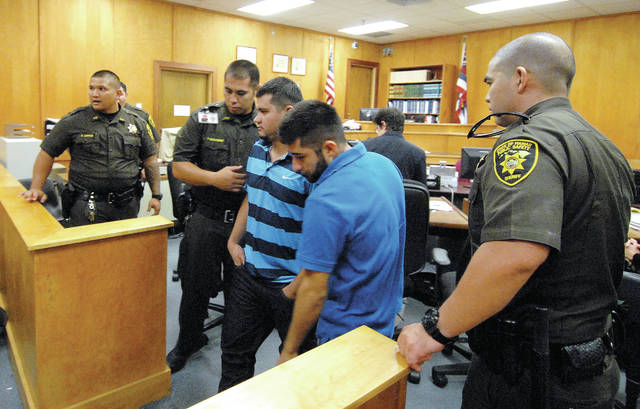KAILUA-KONA — Starting Monday, the 3rd Circuit will fully implement a new procedure that allows criminal defendants who have not been proven guilty to appear unrestrained in court.
KAILUA-KONA — Starting Monday, the 3rd Circuit will fully implement a new procedure that allows criminal defendants who have not been proven guilty to appear unrestrained in court.
While Hawaii is not seeking to fight the ruling that calls for defendants to appear cuff-less, another state within the 9th Circuit Court of Appeal’s jurisdiction hopes to overturn it.
The new policy comes after the 9th Circuit ruled May 31 that a pretrial status criminal defendant appearing in court in shackles is a violation of their constitutional rights.
The ruling clarifies that the Fifth Amendment right to be free of unwarranted restraints applies whether the proceeding is pretrial, trial or sentencing with or without a jury.
The Hawaii State Judiciary started to implement the new policy in July. However, Kona District Court was first faced with the issue Aug. 30 when a public defender requested her client, who is facing a murder charge, appear without chains and in plain clothes for his preliminary hearing.
After consulting with Lt. Patrick Kawai with the state Department of Public Safety and a deputy in the courtroom about the potential safety and security concerns, District Judge Margaret Masunaga granted the defense’s request.
The Department of Justice filed a petition with the U.S. Supreme Court seeking review of this ruling and the Hawaii State Judiciary said it will closely monitor the case.
Along with Hawaii, the 9th Circuit filing impacts California, Arizona, Nevada, Oregon, Idaho, Montana and Alaska, as well as two U.S. territories, Guam and Northern Mariana Islands.
On Thursday, Arizona Sen. Jeff Flake filed an amicus brief with the Supreme Court to overturn the 9th Circuit’s ruling.
“The Ninth Circuit upended traditional courtroom-security protocols last May when it held that routine prisoner-restraint practices violated the Constitution,” the brief states.
According to Joshua Wisch, special assistant to Hawaii Attorney General Doug Chin, Hawaii is not joining the amicus brief.
“But the administration is focused on exploring practical solutions to address the 9th Circuit decision,” Wisch said in an email Friday.
The National Sheriffs’ Association, as well as Arizona Sheriffs’ Association and the Western States Sheriffs’ Association, joined the amicus brief.
“The National Sheriffs’ Association is proud to join Senator Flake’s amicus brief calling for the 9th Circuit’s dangerous decision in U.S. v. Sanchez-Gomez to be overturned,” said National Sheriffs’ Association Executive Director Jonathan Thompson. “This ruling puts sheriffs, deputies, courthouse staff and visitors in danger and runs contrary to law enforcement’s mission of providing public safety.”
The ruling still allows the court to authorize shackling defendants who pose a threat to the safety and security of those in the courtroom.
“Because the sheriffs are responsible for transporting in-custody defendants to court, the sheriffs will directly inform the court if a particular defendant poses a security risk,” said Jan Kagehiro, director of Communications and Community Relations for the Hawaii State Judiciary. “Based on that information, the court will determine whether or not the defendant must be shackled.”




